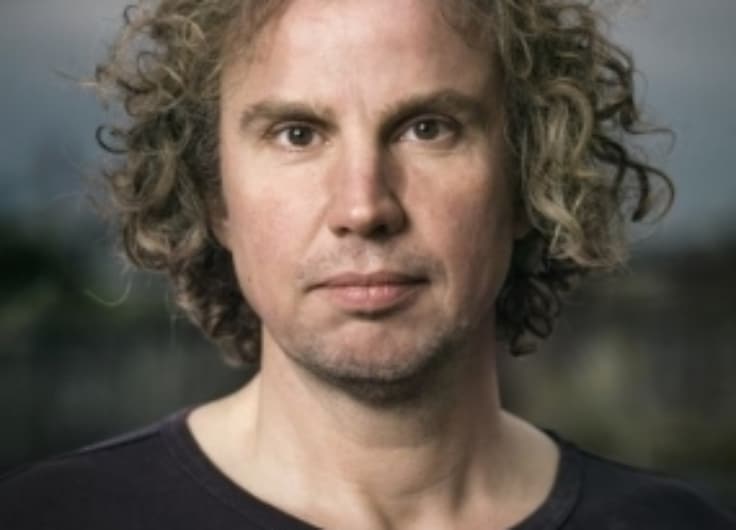On Monday 11 March some forty people – lovers of literature and translation, students, staff and friends of the UCL Dutch Department – gathered in the Haldane Room of University College London for an evening of Frisian culture around the great new bilingual anthology Swallows and Floating Horses. This was also to kick off the year-long programme Dutch100 UK (1919-2019), celebrating the centenary achievements of UCL’s Dutch Department (founded in 1919) and fundraising for the post-Brexit future of Dutch and Low Countries Studies across the United Kingdom and Ireland.
Frisian is the language most closely related to English – as the saying goes: ‘Good butter and good cheese is good English and good Frieze’. Its pedigree is confirmed by the British Library, a short walk from UCL, with its great holdings on Anglo-Frisian relations, which include not only the living Frisian language of today but also the rich and varied Frisian literature produced over time by its many poets and writers – beginning, as we know from the handbook Literature of the Low Countries (1971) by UCL Professor Reinder P. Meijer, with the blind Frisian bard Bernlef, who died in 809, a contemporary of the British missionary St Liudger.
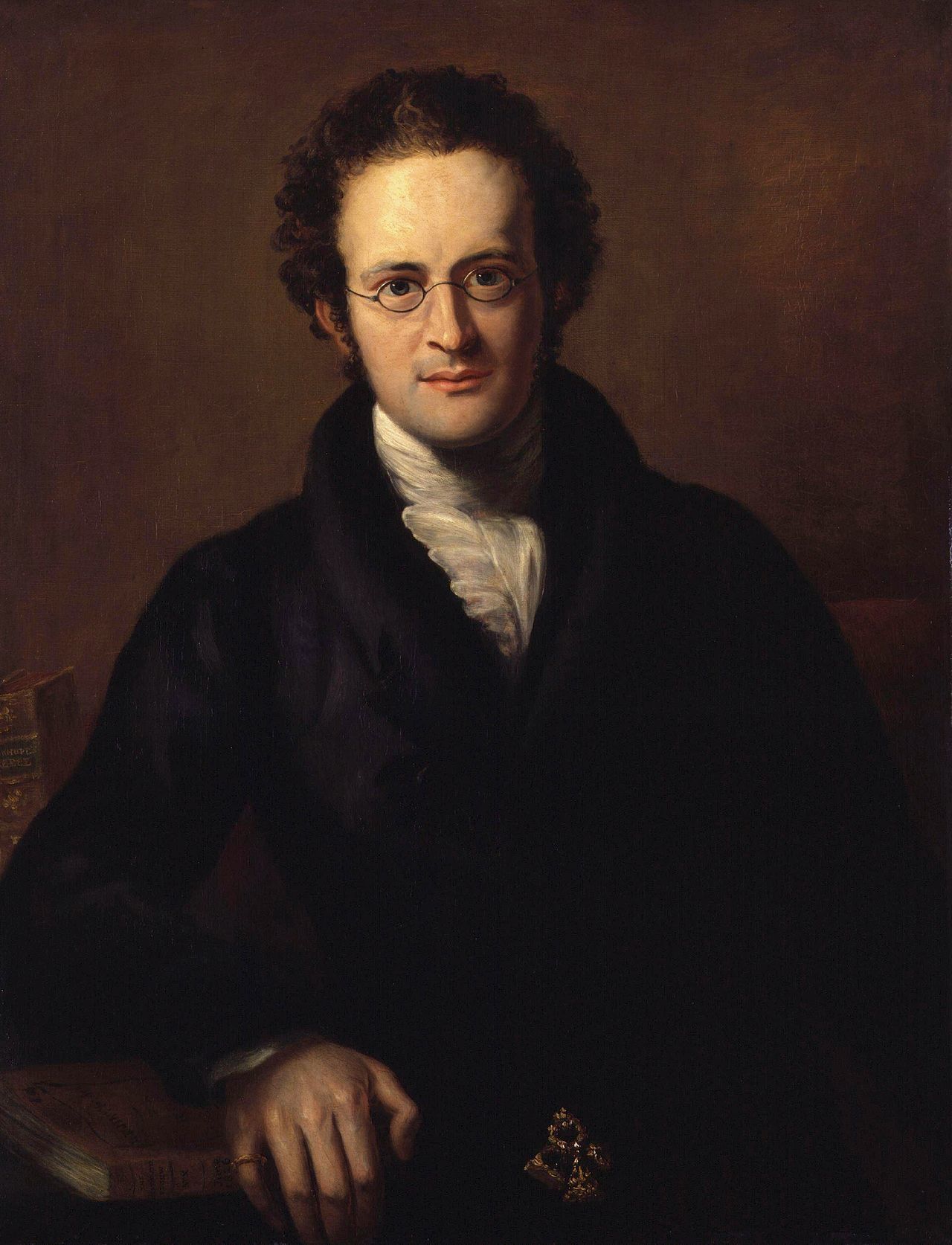 Sir John Bowring
Sir John Bowring© National Portrait Gallery
Beyond this, we note how twenty-five years ago a three-day conference at UCL discussed ‘The Frisians, their Language, Culture and History’. We also note how, early in the 19th century, when UCL was founded by Jeremy Bentham, his polyglot secretary, the radical Sir John Bowring, travelled through Friesland where he met its leading authors in 1829, and published a series of Letters on Frisian Literature in The Foreign Quarterly Review and The Westminster Review. Bowring in turn referred to the humanist scholar Franciscus Junius (1591-1677) and the many important Frisian manuscripts which he deposited in the Bodleian Library in Oxford – where now, from 8-13 July, a Summer School in Old Frisian Linguistics will take place – at Oxford University, remember, where in the late 12th century abbot Emo of Fryslân was the first ever overseas student to come to these shores.
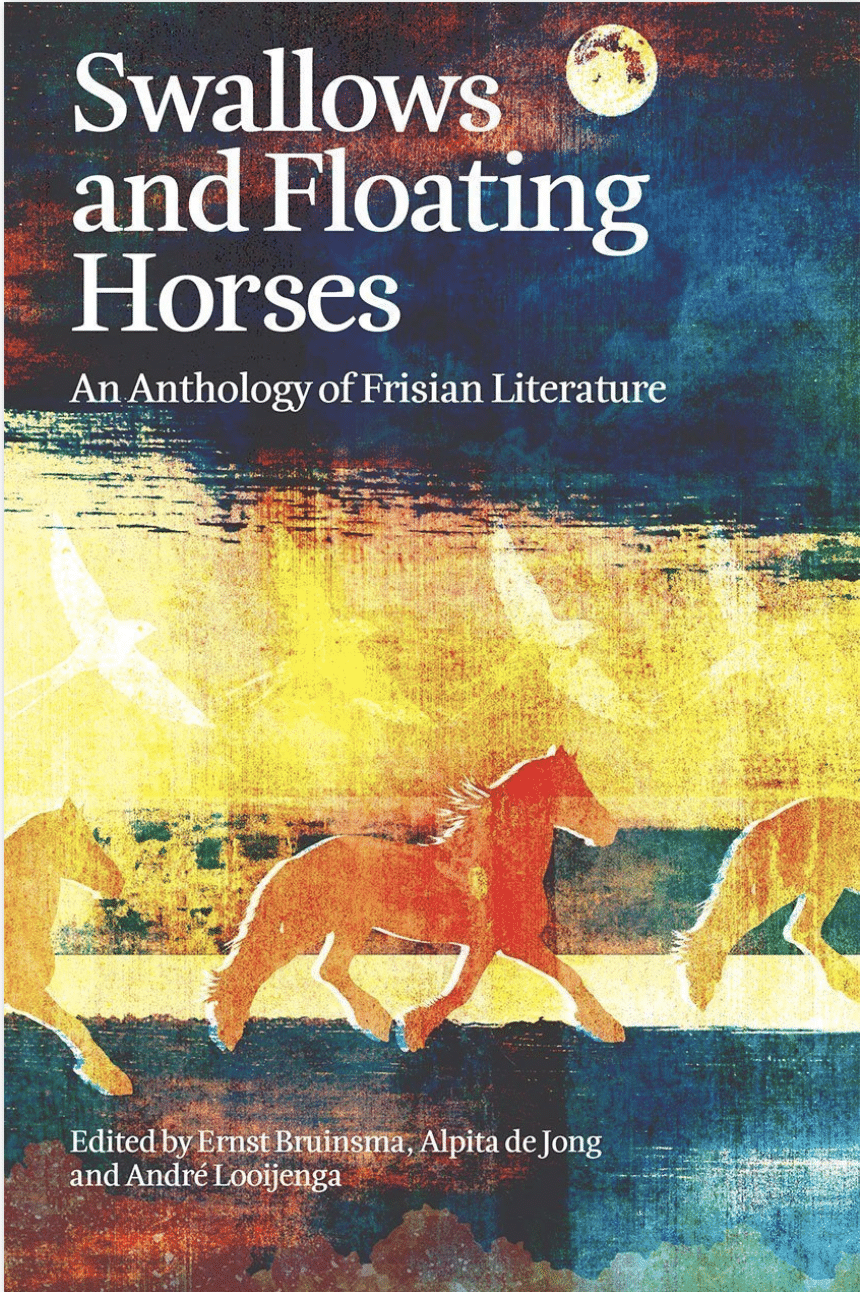
As a tribute to these longstanding Anglo-Frisian connections the launch of Swallows and Floating Horses
featured a Thousand Years of language, literature, culture and history in Frisian.
Opening proceedings, Reinier Salverda read out, first in English, then in Frisian, the poem Bitterswiet by the well-known postwar poet, his aunt Tiny Mulder.
This was followed by our guest of honour, the Dutch Poet Laureate Tsead Bruinja, who at the same time is also an accomplished poet in Frisian. His performance in Frisian, Dutch and English of his own work – 12 volumes published since 2000 – was riveting, and his reading of The Grass that’s Started Laughing (Gers dat alfêst laket, included in the new anthology) gave this poem, especially its ending, a resonance that lingered on long afterwards:
and each gently intended word I lay down before you
on the new grass and at your precious feet
is a word too many that laughs and will laugh’.
Moving on to Swallows and Floating Horses, fragments were read by five of the translators who, over the past five years, made this book – Jetske Bilker, David Colmer, Michelle Hutchinson, David McKay and Jantsje Postma – and who were all there, thanks to the London Book Fair and the Dutch Foundation for Literature in Amsterdam. They presented their favorite texts from the anthology, usually in pairs, reading both in Frisian and in English translation.
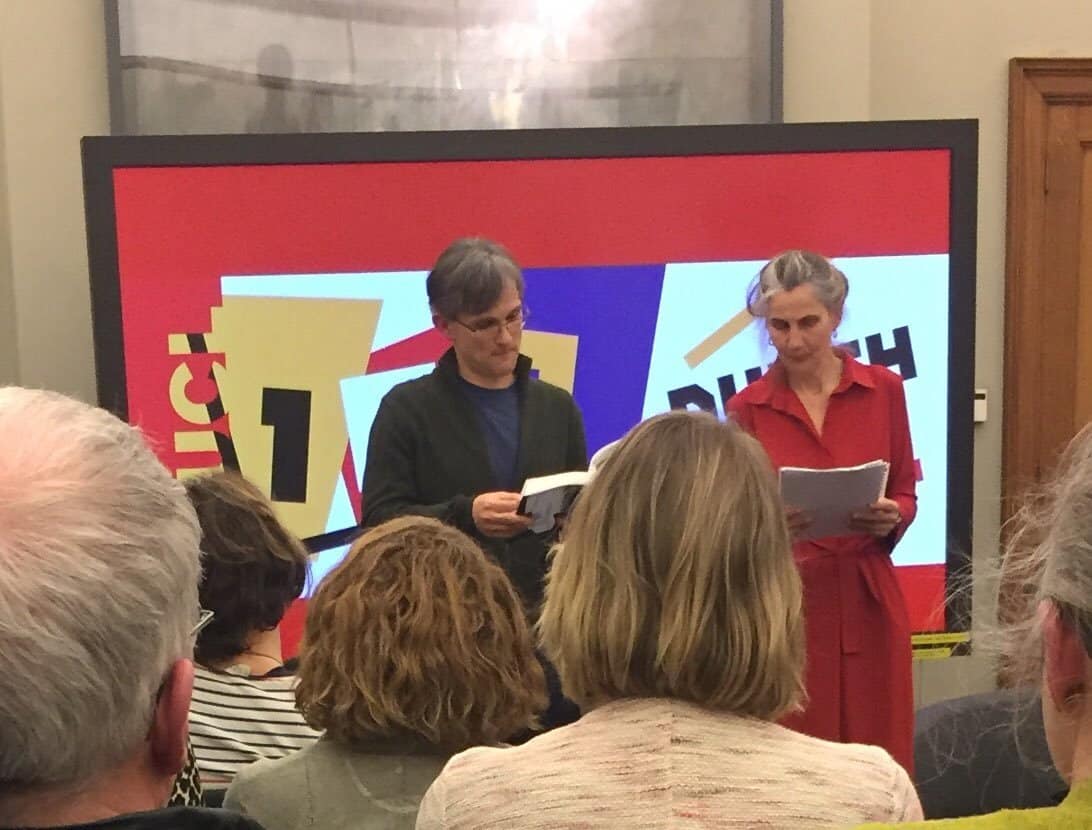
© Twitter Marja Kingma
Between an excellent introduction by its editors (pp. 11-19) and a very useful bibliography (pp. 381-387), the new anthology offers a wide ranging selection of texts by Frisian authors. The most ancient are in the opening section on Old and Middle Frisian (pp. 21-81) and go back to the time of the Bernlef and Charlemagne. Here we find the old Frisian legal texts, which are amongst the most ancient non-roman law to be found in Europe, full of strongly poetic elements, as we heard when The Legend of the Thirteenth Asega (an asega was a lawgiver) was read, in the version included in the first book that was ever printed in Frisian in c. 1485.
The second section (pp. 82-198) opens with texts in East Frisian and North Frisian, the sister languages spoken in northern Germany (pp. 82-96). It then continues with a rich selection of texts from the 16th to the 19th centuries. The undisputed highpoint here is the great literary hoax of the Oera Linda Boek, a fake foundation epic with an insane humour on the Frisian origin of the world and with Frisian as its oldest language. We heard two great texts by the famous Gysbert Japicx, The sixth day, and To my Compatriotic Readers, both of 1668. This was followed by an angry Letter From A Sincere Old Mennonite Minister To His People Who Have Erred of 1795; then the early nineteenth-century In praise of Wons by schoolmaster J.C.P. Salverda; and finally, the great Socialist poet and politician Piter Jelles Troelstra with his revolutionary A New Age (In Nije Tiid) of 1890.
Nullehakkebaitseboksebaitseboksenullehakke
Interspersed throughout the book there are many fascinating but little known texts about the Frisians, by foreign visitors such as Francis Palgrave, Edmondo de Amicis; the impressionist Henry Havard; and the dada poet Kurt Schwitters. The latter’s Die zute Tute
is my personal favorite, in the translation of Anne Feddema, with its delirious ending Nullehakkebaitseboksebaitseboksenullehakke!
The bulk of the book (pp. 199-380) is devoted to Frisian literature of the 20th century right up to the present. Alongside great classics such as Obe Postma, Anne Wadman, Trinus Riemersma, R.R. van der Leest and the children’s poet Diet Huber, we here encounter young poets of today, such as Albertina Soepboer, Tsead Bruinja and the youngest, Elmar Kuiper with his 2016 poem ‘Myn lân’. Of great impact were the readings, first of Eeltsje Hettinga’s Pont Mirabeau (2012), on Paul Celan’s suicide from that bridge in Paris; and then, finally, the greatest of them all, the blind bard Tsjêbbe Hettinga, whose poem It Faderpaard (The Father horse) gave the anthology its title and whose fragment in Frisian was read, unforgettably, by Tsead Bruinja.
The poetry readings were followed by an interview with the London publisher of Swallows and Floating Horses, Clive Boutle. During the discussion the audience showed its great appreciation for this anthology, which – with its beautiful cover and substantial contents – gives a great boost to Frisian literature internationally.
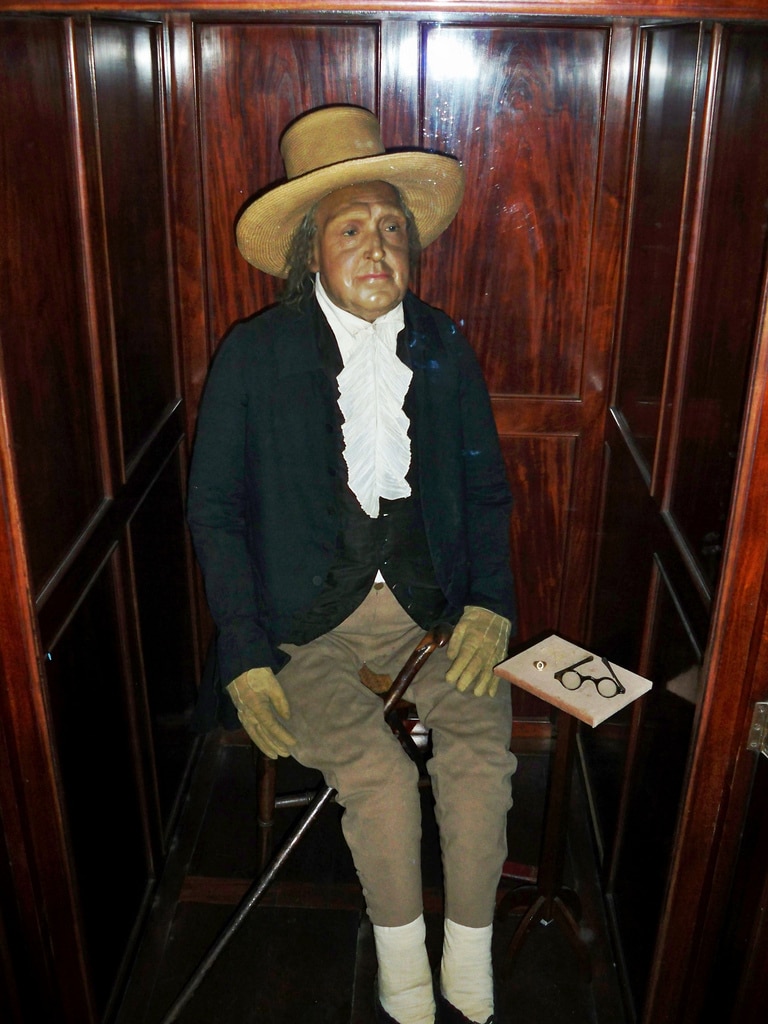 The auto-icon of Jeremy Bentham at University College London
The auto-icon of Jeremy Bentham at University College LondonIn reply to the question: ‘Why this book?’, Clive Boutle pointed to the nine-volume series he published earlier, of anthologies of European literatures in lesser used languages – Breton, Esperanto, Galician, Maltese, Manx, Norman, Occitan, Welsh and now Frisian -, with more on their way, in Cornish, Livonian and Georgian – a truly European endeavour, which makes a solid contribution to the current UNESCO International Year of Indiginous Languages 2019.
To me, the new anthology is also a long-held wish come true. This is the book of Frisian Literature that I would have wished there to be 25 years ago. It is not a (or the) Canon of Frisian Literature. Rather, it offers access to the rich variety and the many delights of poetry in Frisian, a treasure trove of surprising texts in Frisian and English. There is now no longer an excuses for not getting to grips with this language and the treasures of its literature.
After further discussion over drinks, the evening ended with a visit to pay our respects to the founding father (in 1826) of UCL, the philosopher Jeremy Bentham [1748-1832], sitting in his glass case in the main corridor of the Wilkins Building.
Swallows and Floating Horses is published in London by Francis Boutle.



